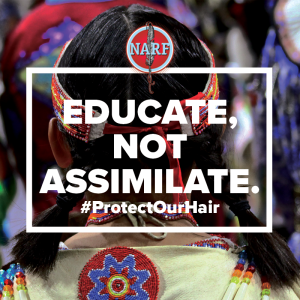On January 30, 2024, the Native American Rights Fund (NARF) and 12 other civil rights organizations sent letters to the Texas Education Agency and the Texas State Board of Education urging the agencies to lead school districts in complying with a new Texas law designed to end race-based hair discrimination in schools, workplaces, and public accommodations. Already in effect in 22 other states, the Creating a Respectful and Open World for Natural Hair (CROWN) Act went into effect in Texas on September 1, 2023.
“Updates to the Texas Education Code to comply with the CROWN Act could quickly make positive changes for public school students who wear traditional braids, locks, or twists,” said NARF Deputy Director Matthew Campbell. “Students, parents, and educators want to know how to comply—and how to enforce—this important new Texas law.”
Outdated student dress and grooming codes often stand at odds with traditional hair styles relevant to the cultural and religious beliefs of students. Campbell noted how clear guidance on what to change and how to enforce this new law would help educators and prompt why implementation matters.
“The CROWN Act needs leadership-driven implementation in Texas, so Native, Black, and all students can learn in public school classrooms free from race-based discrimination,” said Campbell.
“One’s hair or hairdo has nothing to do with how a person learns, yet the right to determine how you wear your hair at school does impact student self-esteem, and for many Native students, hair practices also deeply impact their identity and ability to live as an Indigenous person,” said Campbell. “Native students often protect, cover, or braid hair for religious and cultural reasons, and the CROWN Act bolsters the laws already in place that guarantee Native students’ religious freedoms.”

The CROWN Act, first passed in California in 2019, aims to end the denial of employment, educational, and other opportunities because of natural hair texture and protective hairstyles. 23 states have adopted versions of the CROWN Act, including Alaska, Arkansas, California, Colorado, Connecticut, Delaware, Illinois, Louisiana, Maine, Maryland, Massachusetts, Michigan, Minnesota, Nebraska, Nevada, New Jersey, New Mexico, New York, Oregon, Tennessee, Virginia, and Washington, and Texas, as well as the U.S. Virgin Islands. Arizona’s Governor recently signed an executive order, inspired by the CROWN ACT, to bar hair discrimination.
The following local and national civil rights organizations, signed the letters: American Civil Liberties Union of Texas (ACLU of Texas), Anti-Defamation League (ADL), Children at Risk, Children’s Defense Fund – Texas, Human Rights Campaign (HRC), The Education Trust in Texas, Intercultural Development Research Association (IDRA), the Legal Defense Fund (LDF), MEASURE, National Women’s Law Center, Native American Rights Fund (NARF), Texas Appleseed, and Transgender Education Network of Texas.
Read More About: Native Education and Religious Freedom Issues
More blog posts

